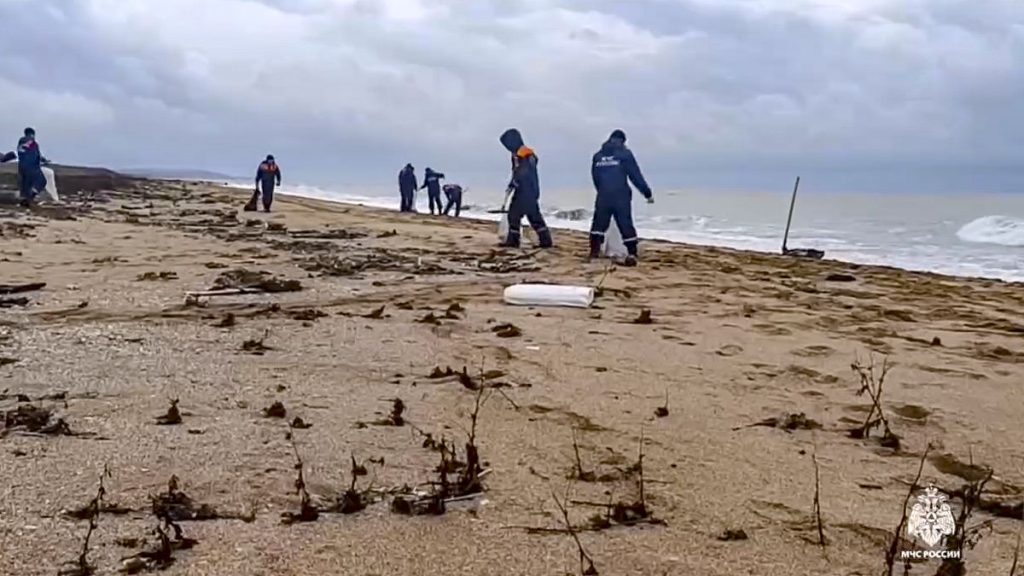The serene coastlines of Sevastopol, the largest city in the Russian-occupied Crimean Peninsula, were recently marred by an oil spill, prompting a regional emergency declaration. The spill, originating from two stricken tankers in the Kerch Strait almost three weeks prior, reached the shores of Sevastopol, raising concerns about the ecological impact on the region’s delicate marine ecosystem. Governor Mikhail Razvozhaev, the Russia-appointed leader of Sevastopol, assured the public that the oil, found on four beaches, was promptly addressed and eliminated by joint efforts of local authorities and volunteers. He emphasized that the situation did not constitute a mass pollution event, aiming to allay fears of a widespread ecological crisis.
The incident unfolds against a backdrop of escalating tensions in the Kerch Strait, a strategically significant waterway separating Crimea from Russia’s Krasnodar region. This strait serves as a vital maritime passage connecting the Sea of Azov to the Black Sea, playing a crucial role in global shipping. Its importance has been further amplified by the ongoing conflict between Russia and Ukraine following Russia’s annexation of Crimea in 2014. The strait has become a focal point of contention, with Ukraine accusing Russia of illegally seizing control of the area and seeking international legal recourse through the Permanent Court of Arbitration.
The oil spill’s impact extended beyond Sevastopol’s shores, prompting a region-wide emergency declaration in Russia’s Krasnodar region a week earlier. Governor Veniamin Kondratyev reported a sustained cleanup operation involving thousands of personnel working to mitigate the environmental damage. The spill’s magnitude underscored the vulnerability of the region’s coastal ecosystems and the extensive efforts required to address such incidents. The scale of the cleanup operation, involving the removal of vast quantities of contaminated sand and soil, highlighted the severity of the pollution.
The incident also drew international attention, with Ukrainian officials characterizing the spill as a significant environmental disaster and calling for further sanctions against Russian tankers. Mykhailo Podolyak, an advisor to Ukrainian President Volodymyr Zelenskyy, emphasized the ecological consequences of the spill, adding another layer to the already strained relations between Russia and Ukraine. The incident serves as a stark reminder of the potential environmental risks associated with maritime activities in the region, particularly within the context of ongoing geopolitical tensions.
The Kerch Strait incident is not an isolated event. In 2018, a collision between two vessels in the strait resulted in a significant oil spill, further emphasizing the vulnerability of the area to pollution. The strait’s narrow confines and heavy maritime traffic increase the risk of accidents, particularly in adverse weather conditions. The repeated occurrence of oil spills underscores the need for enhanced safety measures and stricter environmental regulations to prevent future incidents and protect the region’s fragile ecosystem.
The ecological consequences of oil spills are far-reaching and can have devastating impacts on marine life, coastal communities, and the overall health of the environment. Oil spills can contaminate water sources, kill marine organisms, and disrupt delicate food chains. The economic repercussions can also be significant, impacting tourism, fishing, and other industries reliant on healthy coastal ecosystems. The Kerch Strait incident serves as a stark reminder of the crucial importance of protecting marine environments and mitigating the risks of oil spills through preventative measures and effective response strategies. The ongoing cleanup efforts and the regional emergency declarations highlight the seriousness of the situation and the need for continued collaboration between local authorities, volunteers, and international organizations to address the long-term ecological consequences of the spill.

